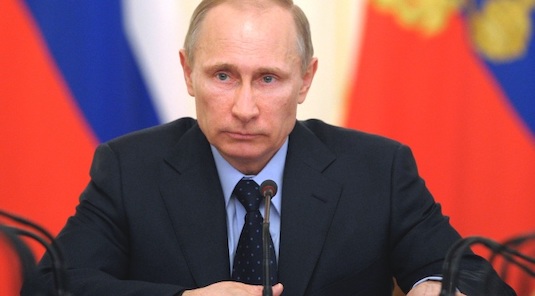Did financially struggling WorldNetDaily get bought by the Russians while we weren’t looking? Because WND has sure been heavily covering for Russia over allegation of meddling in the U.S. presidential election.
Garth Kant’s Dec. 30 WND article on President Obama expelling several Russian officials from the U.S. over the hacking insists that Obama “has presented no evidence that it happened.” He also tries to muddy the issue by claiming that “Not only has the administration produced no evidence Russia ever tampered with the actual vote, no one in the intelligence community ever even claimed that happened” — ignoring the fact that nobody is claiming Russians tampered with “the actual vote.”
Jerome Corsi goes the change-the-subject route in a Dec. 30 article:
President Obama’s punishment of Russia for allegedly hacking the emails of Democratic Party operatives to influence the 2016 U.S. presidential election ignores at least two important facts.
For one, WikiLeaks founder Julian Assange, whose hacktivist organization released the thousands of emails that shed damaging light on Hillary Clinton and her allies, denied the Russians were the source.
In addition, the Obama administration has developed a reputation for manipulating intelligence for political purposes.
Corsi offers no reason why Assange should be trusted by anyone. He also doesn’t mention that back in 2010 friends of WND like G. Gordon Liddy wanted Assange dead.
Leo Hohmann tried to dismiss Russian meddling as 1) unknowable and 2) normal business between countries in a Dec. 31 article:
Whether Russia truly did try to influence U.S. presidential elections in November, as President Obama, Hillary Clinton and several high-profile Republicans claim, may never be known.
But, if it did happen, it wouldn’t be the first time the government of one country tried to influence the elections of another, and rarely do these interventions result in sanctions of the type Obama has imposed on Russia.
In fact, Obama himself has been accused of such meddling on at least two occasions involving elections in Israel in 2015 and the U.K’s Brexit vote in June.
On the flip side, Obama’s severe reaction to claims of Russian “hacking” are in stark contrast from his treatment of China, whom he accused last year of being the culprit in a massive hack of a U.S. government database containing personal information on 4 million current and former federal workers. No sanctions there, only a brief verbal reprimand for China.
There is concern that some of the information that was tapped could be used to aid the espionage operations of China, “which quickly emerged as the likely source of the hack,” reported CBS News on June 5, 2015.
But first, let’s look at the Obama administration’s interventions in the internal politics of Israel and Britain.
The “intervention” into Israel Hohmann cites wasn’t one at all — just the old misleading story about the State Department funding funding a technological infrastructure for a Israeli group’s campaign to support peace negotiations between Israel and Palestine that was later used in a campaign to unseat right-wing Israeli Prime Minister Benjamin Netanyahu — which Hohmann dramatically and laughably declared to be “Obama’s assault on the integrity of the Israeli elections.” As we pointed out, no laws were violated, the organization did not violate any conditions of its deal with State, and no State Department money went toward funding the anti-Netanyahu campaign.
The other “intervention” example Hohmann cites is an Obama speech in London opposing the Brexit campaign. No, really — Hohmann thinks a speech is the same thing as Russian hacking of campaign emails.
